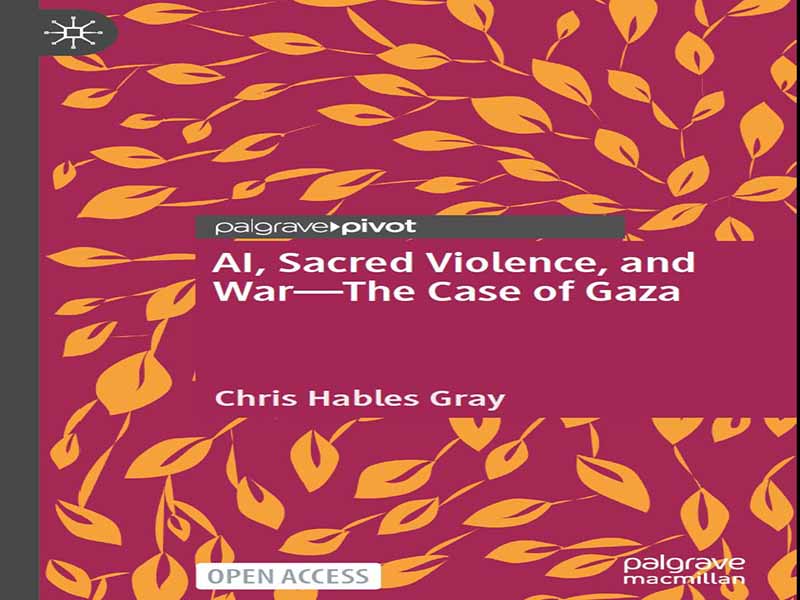- عنوان کتاب: AI, Sacred Violence, and War—The Case of Gaza
- نویسنده: Chris Hables Gray
- حوزه: کاربرد نظامی هوش مصنوعی
- سال انتشار: 2025
- تعداد صفحه: 152
- زبان اصلی: انگلیسی
- نوع فایل: pdf
- حجم فایل: 3.22 مگابایت
همزمان با پایان یافتن این کتاب، اولین سالگرد حمله حماس در ۷ اکتبر به یاد آورده میشود. اما، البته، آن آغاز درگیری بر سر سرزمین «بین رودخانه و دریا» نبود. هزاران سال قدمت دارد. و حتی آغاز مقاومت فلسطینیها در برابر صهیونیستهای متجاوز نیز نیست. آن جنگ بیش از یک قرن قدمت دارد و به هیچ وجه تمام نشده است. با این حال، ممکن است جدید به نظر برسد، چه با توجه به اینکه تمام جهان از طریق شبکه رسانهای بیسابقهای که همه ما را در بر میگیرد، نظارهگر است، با هوش مصنوعی که نابودی غزه را هدف قرار میدهد و شبکههای کامپیوتری که هزاران تلفن و دستگاه دیگر را در سراسر لبنان منفجر میکنند، در حالی که همزمان نظارت آپارتاید دیجیتالی پیچیده، ظلم و ستم و سلب مالکیت ساکنان کرانه باختری را هدایت میکند. اما کمی عمیقتر نگاه کنید، همه چیز بسیار آشنا به نظر میرسد – ویران کردن شهرها، ترور دشمنان، حمله به استحکامات، اشغال سرزمین و ترور غیرنظامیان. فناوریهای نظامی جدید، محاسبات وحشیانه جنگ را تغییر نمیدهند، مهم نیست که متخصصان نظامی چقدر آرزو کنند که این کار را انجام دهند. این فناوریهای غیرنظامی هستند که نسلکشی و پاکسازی قومی را از نظر سیاسی مشکلساز کردهاند، حتی اگر علم فناوری آنها را از نظر فیزیکی آسانتر کرده باشد. اکنون جنگ در قلب و ذهن شرکتکنندگان و در قلب و ذهن ناظران قضاوتکننده جهان پیروز شده است. اگرچه جزئیات دقیق هوش مصنوعی نظامی اسرائیل فوق سری است، اما تشخیص آنچه اتفاق میافتد چندان دشوار نیست زیرا ما تاریخچه، شرکتهای درگیر، نتایج نظامی برنامهها و نحوه عملکرد فناوریها را میدانیم. به علاوه، ما روایتهای افشاگرانی را داریم که برای صحبت با روزنامهنگاران تحقیقی پیش قدم شدهاند. به طور خاص، گزارش مجله +972 در مورد برنامههای Gospel، Lavender و Where’s Daddy فوقالعاده مفید بود. باید اضافه کنم که در فضای نفرت و ترس فعلی، جایی که انتقاد از اسرائیل به طور معمول یهودستیزی نامیده میشود، من سیاستهای اسرائیل را با یهودیت یکی نمیدانم. من یهودیان جهان را مسئول آنچه یک دولت-ملت خاص به رهبری یک حزب راستگرای تأسیسشده توسط تروریستها (صهیونیستهای تجدیدنظرطلب) متحد با بنیادگرایان یهودی انجام میدهد، نمیدانم. در واقع، من عضو قدیمی صدای یهودیان برای صلح هستم و به لطف لس هابلز «من را پدربزرگ صدا نزنید»، طبق قانون نازی یهودی هستم. اگرچه من یک فرد دانشگاهی هستم و این کتاب بر اساس آموزش، تخصص و تحقیقات من نوشته شده است، اما یک پروژه بسیار شخصی نیز هست. من از دکترین نظامی اسرائیل اطلاع دارم زیرا کار من قبلاً بخشی از آن بوده است. در سال ۲۰۰۰، من در کنفرانس «بومشناسیهای رزمی» که توسط نیروی دفاعی اسرائیل (IDF) در اسرائیل برگزار شد، شرکت کردم و سال بعد دوباره برای سخنرانی در دانشکده ستاد و فرماندهی IDF به اسرائیل سفر کردم. سالها کتاب من «جنگ پسامدرن: سیاستهای جدید درگیری» برای همه افسران اسرائیلی که آرزوی فرماندهی بالاتر را داشتند، خواندنی بود. در آن زمان، اسرائیل یک جنبش صلح پر جنب و جوش داشت و حتی در ارتش نیز طرفداران صریح راه حل دو کشور وجود داشتند. اما میزبان من، ژنرال شیمون ناوه، فرمانده دانشکده ستاد و فرماندهی، خوشبین نبود. او مرا به اولین ژنرال ارتدکس ارتش اسرائیل معرفی کرد و گفت که به زودی ارتش تحت سلطه افرادی قرار خواهد گرفت که به همزیستی با فلسطینیها اعتقادی ندارند. فعالان صلحی که در آن زمان ملاقات کردم – یهودی، مسلمان، مسیحی، سکولار – این بدبینی را داشتند. آنها شاهد وقوع همین تغییرات در جامعه اسرائیل به طور کلی بودند. بیست و پنج سال بعد، حق با آنها ثابت شد. این کتاب بر خطرات و غیراخلاقی بودن سیاست نظامی اسرائیل در جنگ با فلسطینیان تمرکز دارد، اما به هیچ وجه دفاعیهای برای حماس (یا حزبالله یا جهاد اسلامی یا حتی سازمان آزادیبخش فلسطین بسیار فاسد و وابسته به آن) نیست. من تمام تروریسم (حملات به غیرنظامیان)، جنایات جنگی و جنایات علیه بشریت، از جمله بسیاری از اقدامات حماس و سایر گروهها را محکوم میکنم. من از تعصب خونین بیزار هستم. من معتقدم که مردم باید آزاد باشند تا در سرزمینهای خود بر خود حکومت کنند – نه اینکه توسط مهاجمان یا ثروتمندان اداره شوند. و آزاد در کنترل بدن، افکار، ابراز احساسات و عشقهایشان. من حرفه، آزادیها و زندگیام را در راه این اصول به خطر انداختهام و همچنان به این کار ادامه خواهم داد. اما این کتاب درباره حماس و چگونگی مبارزه مردم فلسطین برای بقا نیست؛ بلکه درباره اسرائیل و بسیج فناوری پیشرفته و خشونت مقدس آن در تلاش برای پایان دادن به فلسطین است. هر کتابی ناگزیر اشتباهاتی دارد. من از طرف آنها عذرخواهی میکنم و مسئولیت کامل را میپذیرم.
As I finish this book, the one-year anniversary of the October 7 Hamas attack is being remembered. But, of course, that was not the beginning of conflict over the land “between the river and the sea.” It is thousands of years old. Nor, is it even the start of Palestinians resisting invading Zionists. That war is over a century old, and is far from over. Still, it might seem new, what with the whole world watching through the unprecedented media web that embraces us all, with AI targeting the destruction of Gaza and computer networks exploding thousands of phones and other devices across Lebanon, while at the same time sophisticated digitalized apartheid surveillance directs the oppression and dispossession of the inhabitants of the West Bank. But look a little deeper and it seems all too familiar—razing cities, assassinating enemies, storming fortifications, occupying territory, and terrorizing noncombatants. New military techs don’t change the brutal calculus of war, no matter how much military practitioners wish they did. It is civilian technologies that have made genocide and ethnic cleaning politically problematic, even as technoscience has made them physically easier. War is now won in the hearts and minds of the participants, and in the hearts and minds of the judging observers of the world. Although the exact details of Israeli military AI are top-secret, it is not that hard to discern what is happening because we know the history, the companies involved, the military results of the programs, and how the technologies work. Plus, we have the accounts of whistleblowers who have come forward to talk to investigative journalists. In particular, +972 Magazine reporting on Gospel, Lavender, and the Where’s Daddy programs was extraordinarily helpful. I need to add that in the current climate of hatred and fear, where crit-icism of Israel is routinely labeled anti-Semitism, I do not conflate Israel’s policies with Judaism. I do not consider that the Jews of the world are responsible for what one particular nation-state led by a rightwing party founded by terrorists (Revisionist Zionist) allied with Jewish fundamental-ists does. Indeed, I am a long-standing member of Jewish Voice for Peace, and I am Jewish by Nazi law, thanks to Les “don’t call me grandpa” Hables. While I am an academic, and this book draws on my training, exper-tise, and research, it is also a very personal project. I know about Israel’s military doctrine because my work used to be a part of it. In 2000 I attended the Israel Defense Force (IDF) co-sponsored “Martial Ecolo-gies” conference in Israel, and the next year I visited Israel again to lecture at the IDF’s Staff and Command College. For years my book Postmodern War: The New Politics of Conflict was required reading for all Israeli officers who aspired to higher command. At the time, Israel had a vibrant Peace Movement and even in the military there were many outspoken supporters of a two-state solution. But my host, General Shimon Naveh, commander of the Staff and Command College, was not optimistic. He introduced me to the IDF’s first Orthodox general and said soon the military would be dominated by people who did not believe in co-existence with Palestinians. The peace activists I met then—Jewish, Moslem, Christian, Secular—shared this pessimism. They saw the same changes happening in Israeli society at large. Twenty-five years later they have been proven right. This book focuses on the dangers and immorality of Israeli military policy in their war with the Palestinians, but in no way is it an apologia for Hamas (or Hezbollah or Islamic Jihad or even the very corrupt and co-opted PLO). I denounce all terrorism (attacks on civilians), War Crimes and Crimes Against Humanity, including many of the actions by Hamas and other groups. I have a visceral distaste for bloody fanaticism. I believe people should be free to govern themselves in their own lands—not ruled by invaders or the rich. And free in control of their bodies, their thoughts, their expressions, and their loves. I have put my career, my own freedoms, and my life on the line for these principles and will continue to do so. But this book is not about Hamas and how the Palestinian people are struggling to survive; it is about Israel and its mobilization of high-tech and sacred violence in their attempt to end Palestine. A book inevitably has errors. I apologize for them and take full responsibility.
این کتاب را میتوانید از لینک زیر بصورت رایگان دانلود کنید:




































نظرات کاربران